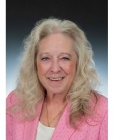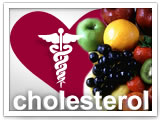
|
Follow Me On: |
 |
Kathleen Petty AVP/Sr Mortgage Originator Global Credit Union Home Loans AK#157293 Phone: (907)261-3458 Cell: 223-4440 Fax: (907)929-6699 License: NMLS Unique Identifier #203077 K.Petty@gcuhome.com https://www.globalcu.org/home-loans/resources/originators/Kathleen-Petty/ |
 | ||
| ||||
March 2007

|
Cholesterol: What You Need to Know
Since there's been a lot of press on the topic, we decided to seek out an informed, yet slightly different and somewhat unconventional view on the subject. Our goal was to bring you a side of the story you may not have heard before. With this in mind, we sought out a certified, medical doctor who is currently in practice and familiar with the current state of cholesterol. At the same time, we looked for someone who "operated" slightly outside the box and could provide insights that went beyond the cholesterol pamphlet found in a doctor's waiting room. Enter Dr. Raymond Oenbrink, a board-certified, family practitioner from Tequesta, Florida. Dr. Oenbrink practices what he calls "Integrative" medical care, combining the best of traditional Western medicine along with the latest in Complementary and Alternative Medicine, including Classical Homeopathy. According to Dr. Oenbrink, the mistake most healthcare providers make regarding "high" cholesterol is generalizing both the causes and the effects. What We Know For some, a problem occurs when the liver produces more cholesterol than the body needs. Since cholesterol is a fatty, sticky substance, having an excessive amount in the blood stream can cause a buildup of plaque along the artery walls. It is this buildup that decreases blood flow and can potentially lead to heart disease and stroke. Since the liver produces cholesterol, it is safe to say that any food item, which at one time had a liver of its own, will contain some amount of cholesterol. Meat, poultry, fish and dairy products all fall into that category; while fruits, vegetables, and grains do not. There are two types of cholesterol, LDL (low-density lipoprotein) and HDL (high-density lipoprotein). LDL is also known as "bad cholesterol" because it's most likely to stick to artery walls. HDL, on the other hand, is what's known as "good cholesterol", as it helps to lower LDL levels. The Theories First and foremost, he says you have to look at your physical health in conjunction with your family history. In other words, a patient with cholesterol levels teetering around 200, who has no family history of heart disease and is otherwise in good shape, may have less to worry about than a patient with the same cholesterol level but who is 50 pounds overweight and has a family history of heart attacks. The second problem is that the goal of keeping cholesterol below 200 is somewhat of a vague one. The aforementioned number represents only the "total" cholesterol level. What may be more important are the individual scores for LDL and HDL levels, which are also measured in a standard lipid panel. Generally speaking, most physicians like to see LDL scores below 130 mg/dL and HDL scores above 40 mg/dL. Another theory suggests looking at cholesterol ratios, both LDL to HDL and Total Cholesterol to HDL. In each case, a ratio of 3.5 to 1 or less is considered optimal in terms of decreasing your chances of heart disease. So, if your LDL level is 130 and your HDL level is 40, you would have a cholesterol ratio of 3.3 to 1, seemingly indicating you're in good arterial health. But, once again, it's important to remember that this indication is a statistical average, not fact. Another unknown has to do with exactly how much one's diet affects his or her particular cholesterol score. We all know people who live on fast food and have zero issues when it comes to cholesterol. At the same time, there are others who, no matter what they eat, have their cholesterol level remain high. The conclusion here is that no one really knows how big a role diet plays. It is safe to say, however, that maintaining a healthy diet – in conjunction with your body type, medical health, and family history – is a good practice for everyone. Regarding food itself, many theories have literally flip-flopped. Oenbrink says, "Remember when butter was bad?" We now know that the trans-fats associated with margarine and similar products are far worse for us. Eggs are yet another food item once associated with giving us "high" cholesterol. Oenbrink says, "In conjunction with the proper diet, eggs are a great source of protein." He adds, "Even more important than what you eat is how much of it you eat." Dr. Oenbrink's Thoughts Oenbrink claims that a quality relationship with a certified family practitioner is a major step towards understanding and maintaining your general health, not to mention your heart health. He says General Practitioners are not only schooled extensively in all areas of medicine, they are re-certified more regularly than other physicians, every 7 years to be exact. Many people immediately seek out the opinions of those they deem as experts. In this case, the expert would be a certified cardiologist. Dr. Oenbrink says it's not uncommon for someone to take a blood test, receive an above normal cholesterol score, and run immediately to a cardiologist. He says that if the chosen cardiologist is someone unfamiliar with your overall history, it's likely you will end up being prescribed a medication (known as a Statin) to lower your cholesterol. Cautious not to besmirch the overall use of Statin medications or cardiologists for that matter, Oenbrink says, "There's far more to the picture." Dr. Oenbrink says that one test he likes to run is what's known as an NMR, or Nuclear Magnetic Resonance. He claims the NMR takes the standard lipid profile to a whole new level. What the test does is break down LDL levels into actual particle size. The theory is that the smaller the LDL particle, the more potential damage it does to the artery wall. He says in addition to the NMR, there are various tests available that can determine the level of plaque buildup along artery walls, thus giving him a clearer picture as to whether the use of a Statin, or some other treatment, is necessary. Oenbrink, a member of ACAM (the American College for the Advancement of Medicine), says there are several less widely accepted treatments for both high cholesterol and hardening of the arteries. ACAM (www.ACAM.org) is a nationwide group of board certified physicians who are looking to enhance Western Medicine with their particular use of Alternative Medicine. One such treatment is known as Chelation (kee-lay-shun), a process he claims can clear blocked arteries. Discouraged by some physicians, Chelation operates under the following theory. Arterial plaque is comprised of both LDLs and calcium, a substance also known to be a heavy metal. According to Oenbrink, when large volumes of ascorbic acid (vitamin C) and other antioxidants are fed intravenously into the bloodstream, the metal is removed, thus making the LDL soluble. At that point, LDLs can be completely processed by the liver. Oenbrink says that many countries in Europe will not let a "stable" patient have bypass surgery unless Chelation has first taken place. Regarding the controversy surrounding Chelation, Oenbrink pointed out that the majority of people who've made advancements in modern medicine were considered heretics at the time of their revelation. He admits that the use of Statin medications is necessary for some people, even citing that long-term Statin use has been shown to be arterially beneficial. Oenbrink's claim, rather, is that the quick and immediate prescribing of Statin medication is, at very least, the easy way out. Dr. Oenbrink is quite a fan of utilizing both Omega-3 Fatty Acids and Niacin in fighting cholesterol. He says, "Omega-3s reduce arterial inflammation which is a predecessor to arterial blockage and Niacin raises the important HDL levels." For those who experience hot flashes when taking Niacin, Oenbrink advises that it be taken in conjunction with vitamin C. Not only is vitamin C a proven antioxidant, it reduces the infamous "Niacin flash". And, of course, Oenbrink cautions everyone against smoking while stressing the importance of both a proper diet and regular exercise. But, above all, the doctor maintains that every person should find a Family Practitioner; one who is not only dedicated to looking for the right answers, but who will find the answers that are right for you. Dr. Raymond J. Oenbrink has been a Family Practitioner since 1987. He attended medical school at Nova-Southeastern University of the Health Sciences, performing his residency at the University Hospital of Jacksonville. Dr. Oenbrink is both a teacher and a published author. He is board certified by the American Board of Family Physicians and the American Board of Osteopathic Family Physicians. He is medically licensed in the state of Florida and currently practices in the city of Tequesta. Dr. Oenbrink is always welcoming new patients into his practice. | ||||||||||||||||||||||||||||||
License #AK157293 You are receiving a complimentary subscription to YOU Magazine as a result of your ongoing business relationship with Kathleen Petty. While beneficial to a wide audience, this information is also commercial in nature and it may contain advertising materials. INVITE A FRIEND to receive YOU Magazine. Please feel free to invite your friends and colleagues to subscribe. SUBSCRIBE to YOU Magazine. If you received this message from a friend, you can subscribe online. UNSUBSCRIBE: If you would like to stop receiving emails from Kathleen Petty, you can easily unsubscribe. Global Credit Union Home Loans AK#157293 |
, 125 W Dimond Blvd #110 Anchorage, AK 99515 Powered by Platinum Marketing © Copyright 2024. Vantage Production, LLC. | |||||||||


